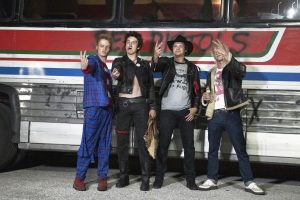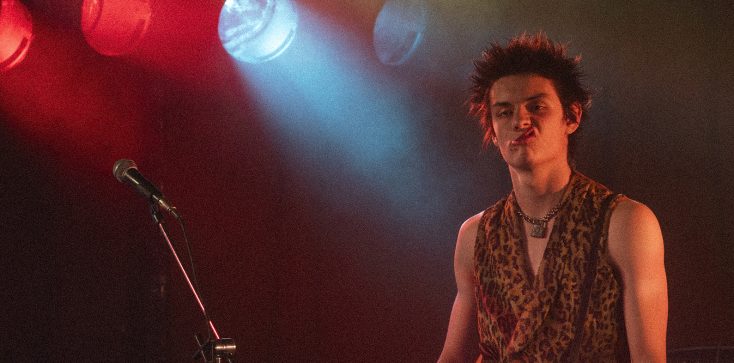
(L-R): Anson Boon as John Lyndon, Louis Partridge as Sid Vicious, Toby Wallace as Steve Jones, Jacob Slater as Paul Cook in PISTOL. ©FX Network. CR: Rebecca Brenneman/FX
By JUDY SLOANE
Front Row Features
HOLLYWOOD—FX’s “Pistol” is a six-episode limited series on Hulu and is based on Steve Jones’ 2017 memoir, “Lonely Boy: Tales from a Sex Pistol.”
Jones (portrayed by Toby Wallace) was the lead guitarist for the Sex Pistols, the British band that was at the center of the punk rock revolution in 1975, which included Sid Vicious (Louis Partridge), John ‘Rotten’ Lydon (Anson Boon) and Paul ‘Cookie’ Cook (Jacob Slater).
Academy Award winner Danny Boyle (“Slumdog Millionaire”) directs and serves as executive producer with the series’ creator, Craig Pearce. The series is produced by FX Productions, and premieres exclusively on their streaming partner, Hulu, on May 31.
Jones was a desperately poor youth from Shepherd’s Bush in west London with a harrowing childhood. He never knew his father, and was raised by an indifferent mother and an abusive stepfather. But he put his pain into his art creating, with the others members of the trailblazing band, three years of chaotic, rage-filled music that changed the culture and remains relevant today.
Boyle and series’ star Wallace spoke with the TV Critics Association, via Zoom, about “Pistol.”
Q: Danny, I would think you feel a real kinship with the Sex Pistols because they were born rebels and they turned popular culture on its ear. Would that be an accurate assessment?
Danny Boyle: Yeah, very much so. One of the things that we did when we started was talk about how incredibly dull Britain/England was (at the time the band emerged). There’s so much in the world (now), and there was so little then. You felt like you were young and then you were old, and there was nothing in-between.
The Pistols were the fountainhead that changed it for so many people coming after them. I think what they did is they gave a sense of timelessness. They said, “This is yours.” And what was different about them is they said that you can do whatever you want with it. You can waste it, be futile or not; it’s up to you. Nothing ever seemed to be the same again, especially for working‑class people.
They were supremely unqualified to do anything. They weren’t from art school like The Beatles were, for instance. They really were from the street. So, it was the triumph of street culture—or counterculture—for sure.
Q: You were a young man when they appeared on the scene. What effect did the Sex Pistols have on you?
Boyle: I wouldn’t be here without the Sex Pistols. I am absolutely aware of that.
I was lucky. I come from a very ordinary, working‑class background and, whether you were aware of it or not, you were going to be your dad. There’s no doubt that this revolution that was created changed many people’s paths. And it set people of that age free to express themselves. It gave them value.
Q: How is it to direct chaos?
Boyle: It definitely changes the way you shoot. We tried with Anthony Dod Mantle (“Slumdog Millionaire”), our cinematographer, to let the actors have the scenes, and then get the cameras to try and follow it.
You can’t really interrupt the songs, and they got very good at playing them. So, the way that we would cover them on stage or in rehearsal became the style by which we try and shoot the piece.
Q: Toby, Steve Jones was way over the top. How did you find your way into him? He was the most reluctant hero that ever lived.
Toby Wallace: Obviously, the script is based off of Steve Jones’ autobiography. So, I felt very blessed in the sense that I had always the book as a guide for everything.
I had also the real Steve that I got to meet and hang out with quite a bit. I think at the heart of him and at the heart of our story was this traumatic experience that he had gone through that birthed that type of anger, and out of the anger was birthed the Pistols because a lot of people could relate to that, especially from these kind of working‑class places and working‑class people. So that was the key for me, personally.
Q: What surprised you about the Sex Pistols?
Wallace: When we walked in to start rehearsal, one of the first things I remember Danny saying to us was, “Oh, your generation is so stimulated all the time.” I think that really wasn’t the case back in the ’70s. It was pretty grim. It was post-war. It was very bleak in terms of stimulation.
That was one of the first things that I remember being surprised by. And we got to play with that as Pistols, because they were outrageous.
Q: What do you like about their music?
Wallace: The music always felt to me (like) it was the raw expression of a class that was underserved and underrepresented. They expressed it in their own way from the streets, and that’s what everybody related to. They didn’t try to overcomplicate it or make it this big show. It felt very truthful.
Q: How much did you rehearse for this?
Wallace: It was two months of band camp, where we all worked with Rick (Smith) and Karl (Hyde,) who were part of the band Underworld, who basically taught us how to be the Sex Pistols, and we got pretty tight. We were a full-on band.
The gigs that we play in the TV show were crazy because we’d play at all these actual venues and we got 100 extras in. Danny would do these speeches beforehand to rev up all the extras. They were almost poetic, really empowering speeches. And all the extras would go crazy. They would love it.
I found every show that we did was guided by how far the extras would take it. They were the guiding force behind every single one of those shows. It felt incredibly real.





